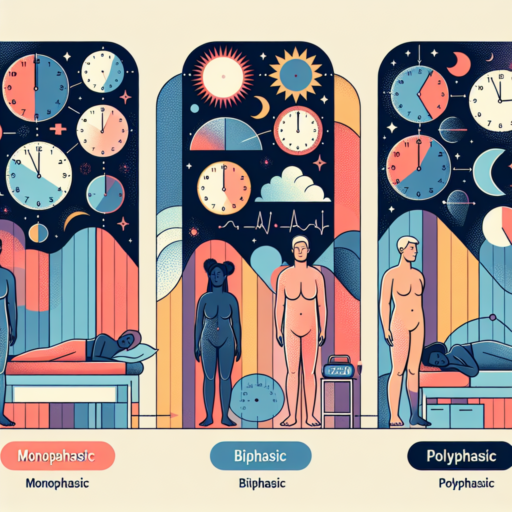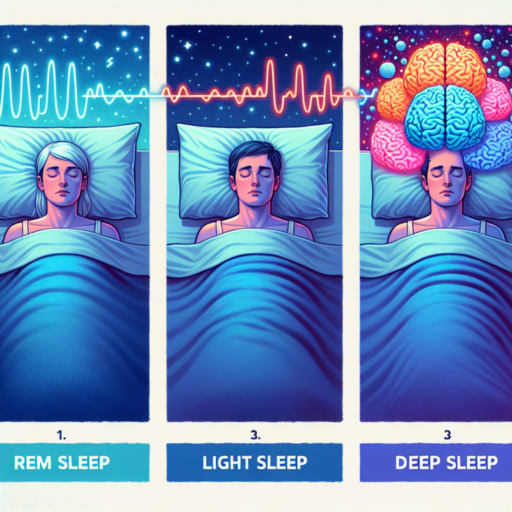What is Normal Deep Sleep Time?
Understanding the normal deep sleep time is crucial for evaluating the quality of your sleep and overall health. Deep sleep, or slow-wave sleep, is the stage of sleep where your body undergoes the most restorative processes. It is during this phase that the body repairs tissues, builds bone and muscle, and strengthens the immune system.
Factors Influencing Deep Sleep
Several factors influence how much deep sleep an individual might achieve in a night. Age is a significant factor, with younger individuals typically experiencing longer durations of deep sleep. Lifestyle choices and sleep environment also play essential roles. Maintaining a consistent sleep schedule, ensuring a comfortable and quiet sleeping environment, and minimizing stress levels can enhance the quality and duration of deep sleep.
It’s estimated that adults should aim for 1 to 2 hours of deep sleep per night, which accounts for about 13-23% of total sleep for healthy adults. However, it’s important to note that these numbers can vary widely among individuals. Monitoring sleep with a smart device or seeking professional assessment can provide more personalized insights into whether you’re achieving normal deep sleep time.
Despite the generalized targets for deep sleep, it’s crucial to pay attention to how you feel during the day. Feeling rested and energetic upon waking is a good indicator that you’re getting adequate deep sleep. If you’re consistently feeling tired or unrefreshed despite a full night’s sleep, it might be time to explore factors negatively impacting your sleep quality, including deep sleep duration.
The Importance of Deep Sleep for Health
Understanding why deep sleep is crucial for health is fundamental in appreciating the complex nature of our sleep cycles. During the deep sleep phase, also known as slow-wave sleep, the body undergoes significant recovery processes. It’s a time when physical and mental restoration takes place, highlighting deep sleep’s essential role in overall health and well-being.
Physical Health Benefits
One of the most noticeable benefits of deep sleep pertains to physical health. This phase is critical for the repair and growth of tissues, strengthening of the immune system, and replenishment of energy stores. It is during deep sleep that growth hormones are released, facilitating these processes. Consequently, inadequate deep sleep can lead to a weakened immune response, reduced energy levels, and impaired recovery from physical exertion.
Mental Health and Cognitive Functions
In addition to physical benefits, deep sleep plays a pivotal role in cognitive functions and mental health. It’s instrumental in memory consolidation—the process of forming and storing new memories. Moreover, deep sleep contributes to the regulation of emotions, helping to mitigate stress and anxiety levels. A consistent lack of deep sleep can be linked to difficulties in concentration, decision-making, and heightened risk for mental health disorders.
It’s evident that the deep sleep phase is fundamental for maintaining and improving health. Ignoring its importance can lead to a myriad of health issues, both physical and mental. Therefore, prioritizing quality sleep, and specifically deep sleep, should be an integral part of one’s health regimen.
How to Measure Your Deep Sleep Time
Understanding and measuring your deep sleep time can significantly improve your overall health and wellness. Deep sleep, or slow-wave sleep, is crucial for physical recovery, memory consolidation, and ensuring a robust immune system. Fortunately, modern technology provides several ways to track this vital sleep stage.
Use of Wearable Sleep Trackers
One effective method to measure your deep sleep time is by using wearable sleep trackers. Devices like Fitbit, Apple Watch, and Garmin offer features that monitor sleep patterns, including deep sleep, light sleep, and REM stages. These gadgets use a combination of movement detection and heart rate monitoring to estimate how much time you spend in each sleep stage. By wearing the device nightly, you can gather data to understand your sleep patterns and make necessary adjustments to maximize your deep sleep time.
Smartphone Apps
For those without a wearable tracker, smartphone apps can be a handy alternative. Applications such as Sleep Cycle, Pillow, and Sleep as Android use the phone’s accelerometer to track your movements during sleep, estimating your sleep stages in the process. Although not as precise as wearable trackers due to the lack of heart rate data, these apps still offer valuable insights into your sleep architecture and help identify trends over time.
Measuring deep sleep time is just the beginning of understanding your sleep health. With the data gathered from these methods, you can start to make lifestyle changes that promote better sleep quality, including managing stress levels, adjusting your sleep environment, and establishing a consistent bedtime routine. Remember, the goal is not just to increase the quantity of sleep but to improve the quality of your restful nights.
Factors That Affect Your Deep Sleep Duration
Understanding Your Circadian Rhythm
Your circadian rhythm, often dubbed your body’s internal clock, plays a pivotal role in dictating your sleep-wake pattern. Misalignment in this clock can drastically impact the quality and duration of your deep sleep phases. Factors such as irregular sleep schedules, jet lag, or shift work can disrupt your circadian rhythm, making it harder for you to achieve restorative deep sleep consistently.
Influence of Lifestyle Choices
Lifestyle choices, particularly those related to diet and exercise, significantly impact deep sleep duration. Consuming caffeine or alcohol close to bedtime can impair your ability to enter deep sleep stages. Likewise, engaging in intense physical activity late in the day might overstimulate your body, preventing it from winding down. On the contrary, regular moderate exercise can improve deep sleep by reducing stress and anxiety levels, thus promoting a more restful night’s sleep.
Stress and Mental Health
Stress and underlying mental health conditions are profound factors that can interfere with deep sleep. The stress hormone, cortisol, can remain elevated in your body if you’re experiencing consistent stress, making it difficult to relax and fall into deep sleep. Anxiety and depression, too, can disrupt your sleep patterns, reducing the overall duration of deep sleep you get each night. Strategies to manage stress, such as mindfulness and relaxation techniques, can improve sleep quality over time.
Improving Your Deep Sleep Time: Effective Strategies
Getting enough deep sleep is crucial for your overall health, boosting your mood, and enhancing your daily productivity. Deep sleep, or slow-wave sleep, plays a significant role in memory consolidation, physical recovery, and energy restoration. However, many people struggle with maximizing their deep sleep time each night. Implementing some effective strategies can make a notable difference.
Maintain a Consistent Sleep Schedule: Your body thrives on routine. Going to bed and waking up at the same time every day, even on weekends, can significantly improve the quality of your deep sleep. This consistency reinforces your body’s sleep-wake cycle, enabling you to fall asleep more quickly and enjoy uninterrupted deep sleep phases.
Optimize Your Sleep Environment: The conditions in which you sleep can greatly affect how well you transition into deep sleep. Ensuring your bedroom is quiet, dark, and at a comfortable temperature can facilitate this. Consider using blackout curtains, white noise machines, and temperature-regulating bedding to create the ideal sleep setting.
Limit Exposure to Blue Light Before Bedtime
Exposure to blue light from screens can interfere with your circadian rhythm and make it harder to fall into deep sleep. Limiting screen time at least an hour before bed can help mitigate this effect. Replace evening screen time with relaxing activities, such as reading or meditation, to prepare your body for a restful night.
Common Myths About Deep Sleep Debunked
When it comes to achieving rejuvenating sleep, understanding the complexity of deep sleep is crucial. However, there are numerous myths surrounding deep sleep that need to be dispelled for a clearer comprehension of our nightly rest. One prevalent misconception is that deep sleep is the sole phase needed for feeling rested. In reality, a healthy sleep cycle includes various stages, each playing a vital role in our overall well-being.
Another widespread belief is that the longer you sleep, the more deep sleep you obtain. The truth, however, tells a different story. Deep sleep, primarily occurring in the first half of the night, does not necessarily extend with longer sleep durations. This underscores the importance of maintaining a consistent sleep schedule rather than simply increasing hours slept.
Furthermore, many assume that waking up in the middle of the night interrupts deep sleep, thus making it impossible to feel fully rested. While it may seem logical, our sleep cycles are designed to handle brief awakenings without significant disruption. What’s crucial is the quality of sleep, including deep sleep, rather than uninterrupted sleep duration.
Deep Sleep vs. REM Sleep: Understanding the Difference
Understanding the difference between deep sleep and REM sleep is essential for recognizing how they contribute uniquely to our physical and mental health. While both stages are crucial components of the sleep cycle, they serve different functions for our bodies and minds.
The Nature of Deep Sleep
Deep sleep, also known as slow-wave sleep, is the phase of sleep during which the body repairs itself and builds up energy for the next day. It’s characterized by slow brainwaves, a decreased heart rate, and relaxed muscles. This stage is critical for physical recovery, immune function, and certain aspects of memory consolidation. During deep sleep, the brain processes and converts short-term memories to long-term ones, making it fundamental for learning new information.
Characteristics of REM Sleep
REM sleep, which stands for Rapid Eye Movement sleep, is the stage most associated with vivid dreaming. It occurs in cycles throughout the night and is characterized by increased brain activity, faster breathing, and temporary paralysis of the limbs. REM sleep plays a significant role in emotional regulation and memory, helping to process complex emotions and solidify memories. The brain in REM sleep is almost as active as when awake, making this a critical period for cognitive functions and creativity.
No se han encontrado productos.
The Role of Age and Lifestyle in Deep Sleep Patterns
Understanding the complex interplay between age and lifestyle in determining deep sleep patterns is crucial for enhancing sleep quality. As individuals age, the structure and quality of their sleep undergo significant transformations. This evolution in sleep architecture, notably the decrease in deep sleep stages, is influenced by a myriad of factors ranging from biological changes to lifestyle choices.
In the context of age-related adjustments, research reveals a marked reduction in the duration of deep sleep, or slow-wave sleep, as individuals progress into middle age and beyond. This alteration can have profound implications for overall health, considering deep sleep’s role in memory consolidation, physical recovery, and metabolic regulation. However, the extent of these changes can be moderated by lifestyle practices including physical activity, dietary habits, and stress management.
Lifestyle choices play a pivotal role in either exacerbating or mitigating the age-related decline in deep sleep. Regular engagement in physical activities and maintaining a balanced diet are found to be beneficial for deep sleep quality across all age groups. Conversely, habits such as excessive consumption of caffeine or alcohol, exposure to electronic screens before bedtime, and irregular sleep schedules can further impair the already diminishing deep sleep stages among older adults. Therefore, adopting a lifestyle that fosters good sleep hygiene is paramount for preserving deep sleep duration and its restorative effects.
How Technology Can Help You Track Deep Sleep Time
Understanding your deep sleep time is crucial for improving sleep quality and overall health. Technology has made significant strides in providing tools that help individuals track their deep sleep phases with remarkable accuracy. This assistance comes in various forms, from wearable devices to advanced smartphone applications, each designed to illuminate your sleep patterns and guide you to better restorative sleep habits.
Many wearable devices, now equipped with sophisticated sensors, can monitor your sleep cycles by tracking your movements and heart rate throughout the night. These gadgets differentiate between light sleep, REM sleep, and deep sleep, providing you with a detailed analysis of your sleep quality. By observing the patterns over time, you can identify factors that may be affecting your deep sleep.
Smartphone applications are another avenue through which technology aids in tracking deep sleep. These apps utilize the phone’s accelerometer to detect movement in bed, estimating when you’re in various sleep stages. Though not as accurate as wearables, they still offer valuable insights for those without a dedicated sleep tracker. They often come with features like smart alarms, designed to wake you up during lighter sleep stages, making mornings less groggy.
Through continuous monitoring and analysis, technology offers actionable insights into improving deep sleep time. Adjusting bedtime habits, optimizing sleep environment, and understanding the impact of lifestyle choices on sleep are just a few ways these technological tools assist in enhancing the quality of rest.
Addressing Sleep Disorders to Improve Deep Sleep Quality
Many individuals find their nightly rest disrupted by various sleep disorders, significantly impacting their deep sleep quality. Deep sleep, an essential part of the sleep cycle, enables physical recovery, memory consolidation, and ensures energy restoration for the body. Addressing sleep disorders not only promises a better quality of life but also enhances one’s ability to achieve deep sleep, crucial for overall health.
Identifying Common Sleep Disorders: Understanding the types of sleep disorders is the first step in improving deep sleep quality. Conditions such as insomnia, sleep apnea, restless leg syndrome, and narcolepsy notably affect one’s sleep patterns. Early identification and treatment of these disorders can lead to significant improvements in achieving restorative deep sleep.
Adapting Lifestyle Modifications: Small lifestyle adjustments can have a profound effect on mitigating the impact of sleep disorders. Incorporating habits such as maintaining a regular sleep schedule, creating a restful sleeping environment, and limiting exposure to screens before bedtime can foster an atmosphere conducive to deep sleep. Moreover, practices like mindfulness and relaxation techniques before bed have shown to improve sleep quality significantly.




